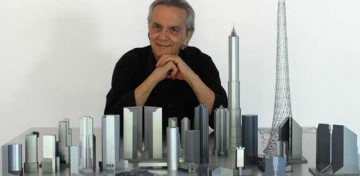Architect claims Google stole invention, alleges $120 billion in potential annual revenue

Santa Monica, CA, December 22, 2014 (Newswire.com) - Eli Attia, considered one of the world’s foremost experts in designing high-rise towers, has sued Google, Flux Factory Inc., and the founders and top executives of both companies accusing them of misappropriation of trade secrets, breach of contract, slander of title, unfair competition and fraud. Attia, partnered with technology firm Max Sound Corporation (OTCQB: MAXD), filed the complaint in Santa Clara County Superior Court earlier this month.
The complaint stems from the intellectual property behind a technology solution designed to shorten and make significantly cheaper the design and construction process while reducing global carbon footprints and increasing housing availability.
Flux Factory began life in 2012 as one of the earliest Google X ideas. According to a company release, the firm exists to develop technology that helps architects and builders design houses and offices more efficiently, while meeting rising demand for new structures to hold families and workers. In May, Flux raised $8 million in funding to address technology solutions that improve inadequate building design, antiquated technology and poor construction quality.
Lawyers with the Dallas firm Buether Joe & Carpenter assert that Flux is founded on intellectual property stolen from New York architect Eli Attia, and Max Sound that bought the authority to enforce Attia’s intellectual property rights.
The complaint asserts that Google and its founders and key executives lured Attia into bringing his 50 years of know how and building experience to Google X where he spent close to a year training a staff of 20 people the significant elements of his life work before Google commandeered his technology and pushed him out of the project and “proceeded to develop and exploit Mr. Attia’s ideas and know-how for their own benefit,” Attia’s lawyers wrote.
In 2009, Attia was looking for a partner to help develop technology he had created for construction sustainable buildings. Google X contacted Attia in July 2010 to propose collaboration, according to the complaint. The two parties agreed that Google X would develop Attia’s technology for a period of several months in an experiment called Project Genie, and then the parties would decide whether to move forward or scrap the project. According to the complaint, a nondisclosure was executed in August, 2010.
The complaint further outlines that in 2011 Google executives reneged on their promise and instead worked to exclude Attia.
Defendants told Attia they had killed the project in December 2011, according to the complaint, and then went on to form Flux Factory in 2012 based on the technology developed by the Genie project. During the course of the companies working together, Google estimated that engineered architecture has a $120 billion potential annual revenue. Attia and Max Sound are suing for compensation.
This IP case is one of several Max Sound has brought against Google this year. With this legal action, Max Sound follows its international strategy of comprehensively asserting their protective rights.
John Blaisure, CEO of Max Sound Corp. says, "We are absolutely committed to safeguarding and protecting our valuable IP assets. Max Sound has several patent infringement complaints against Google and its subsidiaries, and we are open to helping other companies that find themselves in similar David versus Goliath situations with Google. We have identified a pattern of misappropriation of our trade secrets, breach of contract, and fraud that unfortunately needs to be settled in court to resolve."
About Max Sound Corporation: As creators of acclaimed MAX-D HD Audio, Max Sound provides a better solution for Audio, Video and Data transmissions. Max Sound is the company that brings forth technologies for the betterment of our world, including VSL's Optimized Data Transmission Technology. Max Sound®, MAXD® and MAX-D Audio Perfected® are registered trademarks. All other trademarks are the property of their respective owners. To learn more about the MAX-D Technology, please visit http://www.maxsound.com.
SAFE HARBOR STATEMENT UNDER THE PRIVATE SECURITIES LITIGATION RE-FORM ACT OF 1995: Statements in this press release which are not purely historical, including statements regarding Max Sound's intentions, beliefs, expectations, representations, projections, plans or strategies regarding the future are forward-looking statements within the meaning of the Private Securities Litigation Reform Act of 1995. The forward-looking statements involve risks and uncertainties including, but not limited to, the risks associated with the effect of changing economic conditions, trends in the products markets, variations in the company's cash flow or adequacy of capital resources, market acceptance risks, technical development risks, and other risk factors. The company cautions investors not to place undue reliance on the forward-looking statements contained in this press release. Max Sound disclaims any obligation and does not undertake to update or revise any forward-looking statements in this press release. Expanded and historical information is made available to the public by Max Sound Corporation and its Affiliates on its website http://www.maxsound.com or at http://www.sec.gov.